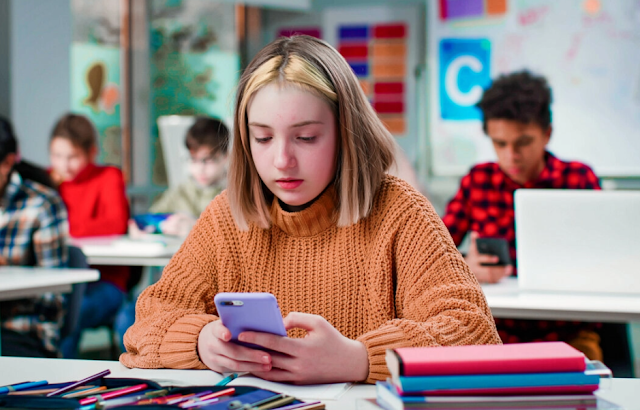This Is What Happened After Several Schools
Banned Cellphones
The Epoch Times, Health
Banning cellphones in schools improved academics, reduced bullying, and reduced students’ need for counseling, a 73-page Norwegian paper has found.
Girls benefited the most from the policies.
“Banning smartphones significantly decreases the health care take-up for psychological symptoms and diseases among girls,” Sara Sofie Abrahamsson, a postdoctoral researcher and the paper’s sole author, wrote in the abstract. “Post-ban bullying among both genders decreases.”
The researcher observed no negative impact from introducing such a policy.
“The phones are an absolute distraction. Even if a kid has the phone in their pocket during class, if the phone is on vibrate every time it vibrates, which is constantly, their mind automatically shifts away from what the teacher is teaching to the phone,” Tom Kersting, a psychotherapist who was a school counselor for 25 years, told The Epoch Times in agreement with the report’s findings.
Major Findings
Therefore, Ms. Abrahamsson used a survey to collect data from Norwegian middle schools on smartphone use and whether and when they had introduced any smartphone regulations.
These data were then matched to a school’s data, including student grades set by teachers and external exams, student GPAs, student visits to psychologists and general practitioners, and measurements for bullying.
- The number of psychological consultations was reduced by 60 percent in female students.
- The incidence of bullying for both girls and boys lowered.
- Girls made gains in GPA and externally graded mathematics tests.
- Girls were more likely to attend an academic high school track.
Girls from low socioeconomic backgrounds showed the most improvement.
However, smartphone bans did not affect boys’ mental health and GPA.
Smartphone Bans in the United States
Several school districts have introduced more stringent phone policies that have received growing support from teachers, students, and parents alike.
Bill Wilson, superintendent of Brush School District in Colorado, who has a doctorate in education, introduced a change to the district’s cellphone policy in 2021.
While the district always had a policy prohibiting cellphone use during school hours, there were no consequences for violating this policy. So in 2021, a policy was implemented: Unexempted students caught using phones would have to get their parents to come to the school to remove the phone.
Mr. Wilson told The Epoch Times that when a phone-banning policy was first suggested, many parents came to hearings with the fear that schools wanted “to control their kid and take away their kid’s ability to contact them if something happened in the school day,“ implying that ”the schools are doing something inappropriate by not giving their kids their rights.”
The school policy was later amended so students could have their phones, but they had to be in their backpacks. Furthermore, students with medical conditions or certain obligations that required smartphone monitoring could check their phones in the school office.
Gradually, parents warmed up to such a policy.
“The more conversations we have, even with those who are vehemently opposed initially, the more they begin to realize that we’re on the same team,“ he said. ”We’re trying to help navigate what has become a very challenging situation successfully in the best interest of kids and the learning environment.”
Mr. Wilson said teachers and students were among the first groups to appreciate such a policy.
“[Students] were thankful to not have that distraction, and that pressure and that worry about whether somebody was going to make a comment about their clothes or take a picture of them or multiple pictures of them while they’re talking, and wait until they get a silly one and make a meme out of it,” Mr. Wilson said.
In schools that have implemented cellphone restrictions, teachers also have begun reporting that their students are more engaged in and out of class. Students have become more social and interact with each other, and disciplinary actions have been reduced.
With schools moving toward digitalized learning, Ms. Blocker cautioned that teachers and administrators should be critical when “evaluating the goals and outcomes of technology use in classrooms.”
She said that “the reality is, when technology isn’t introduced thoughtfully, it doesn’t always live up to the hype. Not every new tool will revolutionize how we teach and learn, especially if there isn’t careful integration that is aligned with a clear pedagogical purpose.”
Mr. Wilson sees smartphone bans at schools across the United States gradually becoming the norm.
In 2023, Florida became the first state to enact a statewide ban on phones and social media during class time.
The state’s Orange County also enacted a phone ban during school hours, with some teachers reporting a remarkable change in student behavior and classroom engagement.
Ohio, Oklahoma, Vermont, and Kansas have since passed bills to control phone use in schools. Several school districts, including those in Maryland, California, Virginia, and Connecticut, have also implemented phone bans.
“It’s happening more, and I think it’s becoming more restrictive. From no use during the school day, and then everybody has their own slice on whether students can have them,” Mr. Wilson said.
================================================================

No comments:
Post a Comment